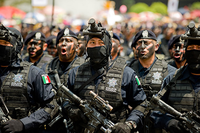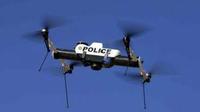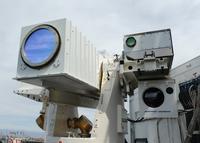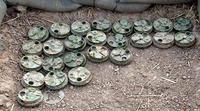-
What we know, and what we can do, about school shootings
Since the early 1970s, school shootings at American elementary, secondary, and higher education institutions have been a painful reality for American society; after each incident — like the recent attack in Newtown, Connecticut — there is voluminous dialogue about what can be done to prevent the next such tragedy; a new study explores what we have learned about these tragic incidents, and what can be done to prevent them
-
-
New Mexican government to set up a new police force to fight drugs, crime

Mexican president Enrique Pena Nieto has said his government would create a new national police force as part of a new approach to dealing with drugs, crime, and violence; Pena Nieto took office on 1 December; the new, militarized police force would have about 10,000 officers initially, but would eventually grow to 40,000
-
-
Connection between goth subculture, mass shootings appears tenuous

Classmates of the otherwise bland and elusive Adam Lanza, who last Friday killed twenty children and six adults at the Sandy Hook school in Newton, Connecticut, described him as “goth”; is there a “goth” connection in the Newtown school shooting? The question is asked because news reports have connected several perpetrators of both mass shooting and killing on a smaller scale to goth culture; a closer examination shows that the relationship between goth and mass shooting is tenuous
-
-
NRA shuts down Facebook page in wake of Connecticut shooting
In the immediate aftermath of the Newtown shooting, the National Rifle Association (NRA) has deactivated its Facebook page, just one week after celebrating the fact that it has gathered 1.7 million “likes” on the page; the debate about whether the United States needs stricter gun controls continues, though
-
-
U.S. Defense Secretary signs order to deploy anti-missile units in Turkey

Secretary of Defense Leon Panetta on Friday signed an official deployment order to send 400 American military personnel as well as two Patriot air defense units to Turkey as the cross-border tensions between Turkey and Syria have increased
-
-
Privacy advocates succeed in delaying drone purchase by California country sheriff

Congress earlier this year passed legislation earlier this year ordering the Federal Aviation Administration (FAA) to accelerate the approval of the use of unmanned aerial vehicles (UAVs) for law enforcement and other domestic purposes, and, law enforcement agencies around the country are moving to purchase drones; Alameda Country, California planned to buy a drone, but action by the ACLU and the Electronic Frontier Foundation forced the county to hold a public hearing on drone use and formulate guideless for, and set limits on, drone use by police
-
-
Deployable RF data backbone which matches fiber optic capacity
DARPA envisions 100-Gigabit per second RF communications link between airborne and ground assets; the goal is for the data link to achieve a range greater than 200 kilometers between airborne assets and a range greater than 100 kilometers between an airborne asset (at 60,000 feet) and the ground
-
-
Breaking news: Gunman kills 27, self, in Connecticut elementary school
A 20-year old Newtown, Connecticut man entered the Sandy Hook Elementary School in town and began shooting; police says that, so far, there are twenty-seven dead and scores of injured; among the dead are twenty students and six staff members; most of the students were killed in the classroom of the gunman’s mother, who was also shot and killed; police reports that so far it appears that there is only one person injured who requires hospitalization
-
-
High Russian official: Assad losing the ground war
The Assad regime does not have many friends left, and yesterday one of them admitted that Assad was losing the war; Mikhail Bogdanov, the deputy foreign minister of Russia, said the regime faced possible defeat to the rebels, adding with unusual frankness for a diplomat: “One must look facts in the face”
-
-
U.S. Navy scientists honored for significant portfolio of newly patented discoveries and inventions

U.S. Navy scientists and engineers in 2012 once again had the world’s most significant government portfolio of newly patented discoveries and inventions, according to a November report published by the Institute of Electrical & Electronics Engineers (IEEE)
-
-
Climate change, water shortage play only secondary role in causing conflict – at least so far
Intelligence services and militaries around the world have been talking about, and preparing for, the danger of “water wars” and about climate change as a threat to national security; the results of an EU-funded research project, however, found that such discourses oversimplify a complex reality; climate and water resource changes are important, but play only a secondary role — at least for the time being — in the causation of conflict and insecurity compared to political, economic, and social factors
-
-
Top U.S., Canadian officials meet to discuss quickening pace of Arctic changes

One manifestation of global warming is the accelerating pace of Arctic ice-cap melting; the U.S. Navy Arctic Roadmap, authored by the Navy’s Task Force Climate Change, notes that, “Because the Arctic is primarily a maritime environment, the Navy must consider the changing Arctic in developing future policy, strategy, force structure and investment”; top U.S. and Canadian officials meet to discuss the implications of the rapidly melting arctic ice
-
-
Syria military launches Scud missiles at rebels
Facing growing political isolation, deteriorating economic conditions, and military setbacks, the Assad regime is escalating the level of violence in its war against the opposition; the three latest weapons the regime used in its effort to hold off the rebels: Scud missiles, cluster bombs, and incendiary munitions; yesterday, Pakistan became the 69th country to close its embassy in Damascus
-
-
Technology emulates the Blind Cave Fish to help underwater vessels navigate with ease
Scientists have invented a “sense-ational” device, similar to a string of feelers found on the bodies of the Blind Cave Fish, which enables the fish to sense their surrounding and so navigate easily; using a combination of water pressure and computer vision technology, the sensory device is able to give users a 3-D image of nearby objects and map its surroundings
-
-
A new tool supports humanitarian demining

Landmines and other abandoned explosive ordnance are part of sad legacy of many conflicts; these devices can remain active during decades threating humans in the affected areas and depriving them of their lands and resources; today, a huge part of these tasks of humanitarian demining are still conducted by using hand-held detectors, particularly, metal detectors, though other detectors are being introduced gradually
-
More headlines
The long view
Tantalizing Method to Study Cyberdeterrence
By Trina West
Tantalus is unlike most war games because it is experimental instead of experiential — the immersive game differs by overlapping scientific rigor and quantitative assessment methods with the experimental sciences, and experimental war gaming provides insightful data for real-world cyberattacks.
Using Drone Swarms to Fight Forest Fires
Forest fires are becoming increasingly catastrophic across the world, accelerated by climate change. Researchers are using multiple swarms of drones to tackle natural disasters like forest fires.
Testing Cutting-Edge Counter-Drone Technology
Drones have many positive applications, bad actors can use them for nefarious purposes. Two recent field demonstrations brought government, academia, and industry together to evaluate innovative counter-unmanned aircraft systems.
European Arms Imports Nearly Double, U.S. and French Exports Rise, and Russian Exports Fall Sharply
States in Europe almost doubled their imports of major arms (+94 per cent) between 2014–18 and 2019–23. The United States increased its arms exports by 17 per cent between 2014–18 and 2019–23, while Russia’s arms exports halved. Russia was for the first time the third largest arms exporter, falling just behind France.
How Climate Change Will Affect Conflict and U.S. Military Operations
By Doug Irving
“People talk about climate change as a threat multiplier,” said Karen Sudkamp, an associate director of the Infrastructure, Immigration, and Security Operations Program within the RAND Homeland Security Research Division. “But at what point do we need to start talking about the threat multiplier actually becoming a significant threat all its own?”
The Tech Apocalypse Panic is Driven by AI Boosters, Military Tacticians, and Movies
By Matthew Guariglia
From popular films like a War Games or The Terminator to a U.S. State Department-commissioned report on the security risk of weaponized AI, there has been a tremendous amount of hand wringing and nervousness about how so-called artificial intelligence might end up destroying the world. There is one easy way to avoid a lot of this and prevent a self-inflicted doomsday: don’t give computers the capability to launch devastating weapons.
